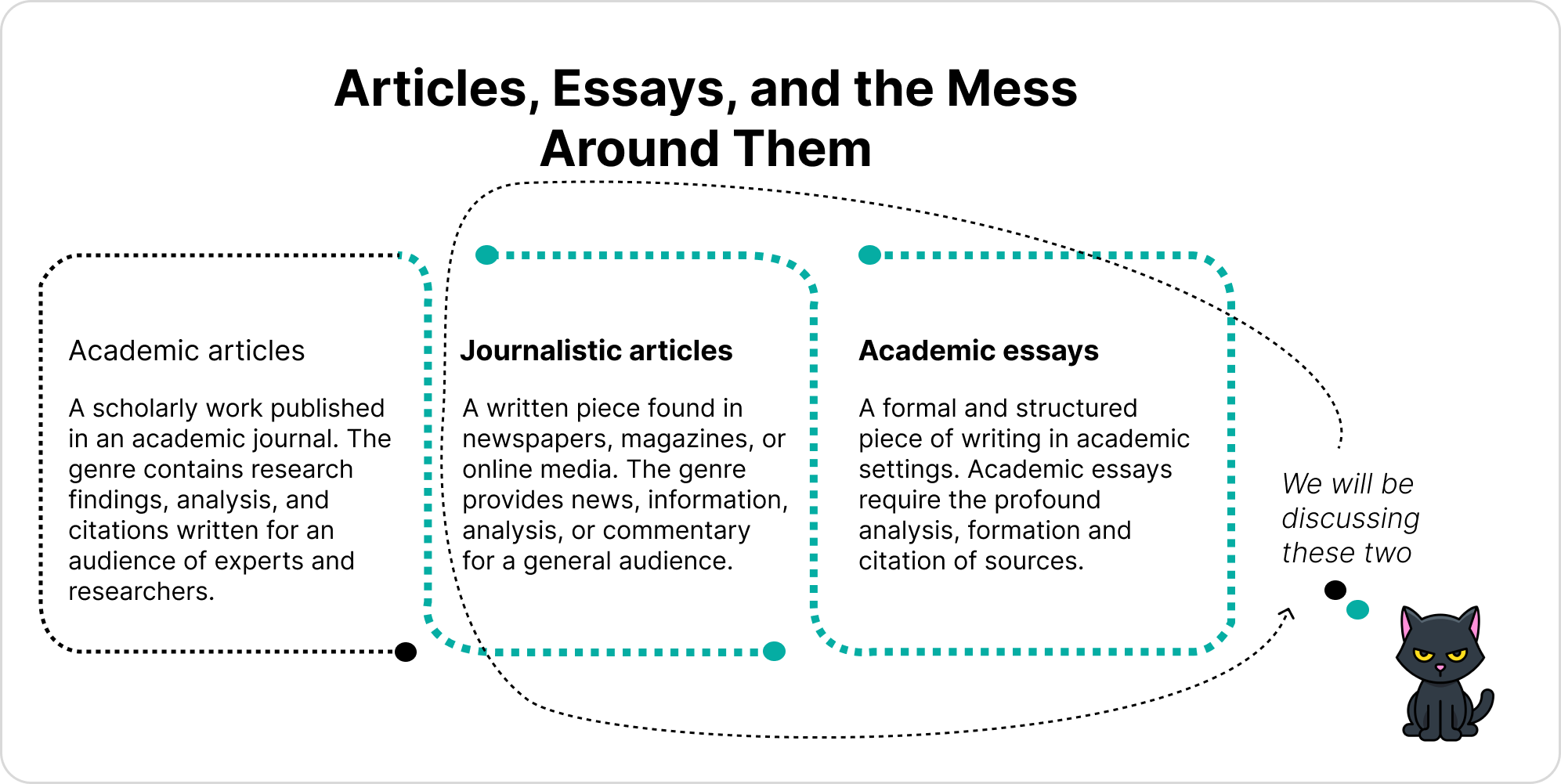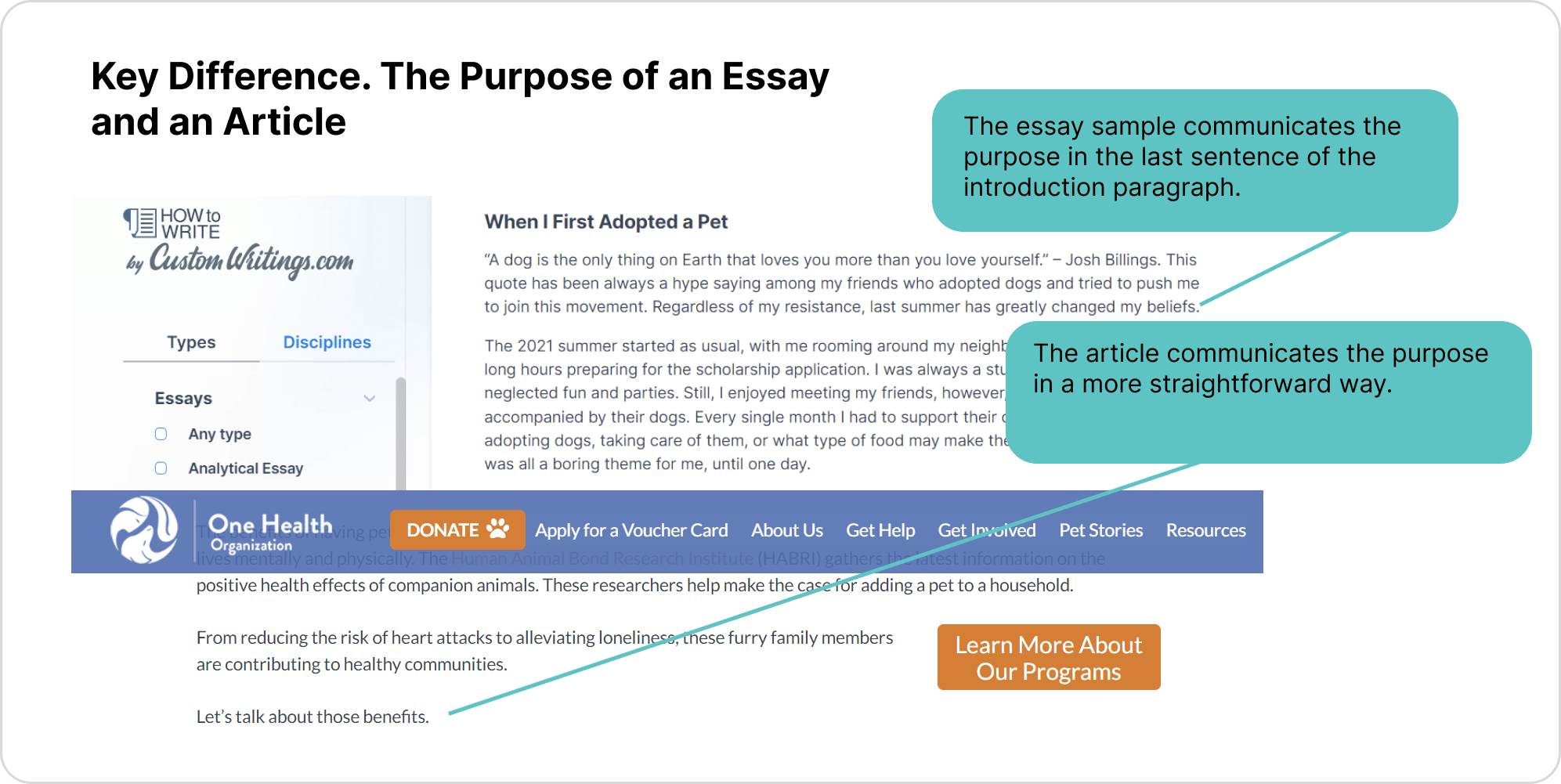Many students are confused when it comes to understanding writing formats. You may have heard some people using the terms “essays,” “academic papers,” or just “papers” and “articles” as synonyms. Indeed, this little academic mess is quite tricky to understand. To make it more clear, read alongm check out these tips from math experts, and learn what essays and articles are and how to never mix them up again.
What Is an Article, and What Is an Essay?
Both articles and essays are forms of writing used for communication in many fields, including a debate on reading vs writing. Basically, that makes them somewhat similar and confusing. However, these two genres also have very distinct differences.
“The term ‘article’ is used for the academic field, where it’s a scientific sub-genre, and for the journalistic field, where it’s a way for websites and magazines to interact with readers.”
Nicholas Evans, professional writer at Customwritings.com, ESL department
Here, we will discuss the article in the journalistic meaning as a piece of writing aimed at a broad audience.
Articles and essays. Definitions and major features
Starting with the terms, here are the simplest definitions for both:
- An article (in journalism) is an informal form of writing book report writing service , typically published in newspapers, magazines, and web sources for a broad, general audience. Articles typically intend to entertain or inform the reader.
- An essay is a formal writing form typically published in academic and scholarly contexts for a specific audience. Essays are usually written to educate or persuade readers.

Key details for each form
Although the definitions above cover the most distinct features of essay and article types, it will be more helpful to dive into the details. So, let’s compare the specific differences between these two written pieces.
| Journalistic article | Academic essay |
| Articles are typically used in magazines and websites to entertain readers or inform them about recent news or up-to-date topics. | Essays are typically used either in colleges and universities or by professional writers, public speakers, or activists to address important social issues. |
| Tends to prioritize clarity and straightforward language. | May incorporate more complex or ambiguous ideas for analysis. |
| Usually intended for broad audience groups. | Usually intended for a specific audience. |
| Has some generic rules for formatting, but they are not as strict as for essays. | Has strict requirements for structure, paragraphs, lengths, quotations, references, and formatting. |
| The text almost always goes under the headers for better readability. Headers are the main structural components. | The text can go under the headers, but that is not a common rule. The essay’s basic structural components are an introduction, body, and conclusion. |
| May be more neutral or objective, depending on the topic. Objectivity is an important requirement, as articles must not control and govern people’s opinions. | Often has a more formal and analytical tone. Although some essay genres tend to be more objective, like the critical or analytical type, in general, essays are more subjective. |
| May include research, but it is optional. | Usually requires more research and an evidence-based approach. |
| Can include multiple inserts. Therefore, it varies in authors’ voices and can consist of commentaries from different people, which are not formatted as citations. | All external inserts in the essay are typically formatted as citations. Can include some personal stories or side narratives, but the author’s voice is usually prominent and consistent. |
“In fact, all genres are related and have common roots. All modern forms we have now came from the writing practices from Ancient Greece and the development of writing during the Middle Ages and Renaissance.”
Victoria Davis, TOP-writer at Customwritings.com
What Are the Similarities Between Articles and Essays? Why Is It Easy to Confuse the Two?
Anyone from Earth’s 7 billion population can be an author nowadays and publish almost anything. For that reason, genre characteristics are not as clear or strictly constrained as before.
However, both article and essay genres have their typical characteristics. Here are the most common ones for these two writing types:
- Essays and articles are good for conveying important messages. For instance, the essay by Stephanie Ericsson, “The Ways We Lie,” is as effective in exploring the phenomenon of lying as the article from Britannica. They have different audience groups and different structures. However, both are quite informative.
- They can be interchangeable. Let’s say it was not a post in Britannica but an article in some casual lifestyle magazine. Can the publisher shorten and modify Ericsson’s essay a little bit and publish it as an article? Yes, of course they can. The article must declare the authorship and publication permission, but the essay can be easily turned into an article. The same principle works the other way around.
“It is so easy to mistake the essay for the article and vice versa because you can easily find both genres in free access. The frames of the genres get more and more vague with the development of digital information formats.”
Jamie Clark, a professional writer at the Computer Science Department
But What Is the Main Difference Between an Article and a Formal Essay? How Can I Easily Distinguish Them?
Indeed, it is a challenging task to put the finger on the main difference between an article and an essay. We asked three of our professional writers to propose one key question that will help you clarify whether you are dealing with an essay or an article. Here are their propositions:
Nicholas Evans: “What is the supposed purpose?”
Nicholas: “An article is typically more straightforward at ‘breaking the fourth wall’ and communicating directly with the reader. You will see the purpose, written from the first-person perspective, such as ‘Let’s dive into the topic.’ That is why articles are also more manipulative. On the contrary, an essay will state the purpose within the thesis statement, in a more formal way, and from the third-person perspective.”

Jamie Clark: “How formal is the language and style?”
Jamie: “Does the writing use a formal or informal tone, and is the language complex or straightforward? The article is a piece of informal journalistic writing, so you will most likely find a more informal tone or even slang in articles. You will never find anything of that type in official academic essay writing.”
Victoria Davis: “Where did you find it?”
Victoria: “Magazines and websites can publish academic articles as an excerpt from the typical rules. In that case, they will specify what that piece is. However, scientific journals will never publish entertaining articles to entertain their readers with easier formats. Scientific journals do post peer-reviewed articles, but these belong to a completely different genre.”
The article and the essay are both challenging but fascinating genres, each with its own peculiarities and requirements. With more experience, you will spot the differences and similarities on the fly. As for now, hopefully, this article helped to clarify this mystery for you—and perhaps even inspired some topics for a classic literature paper along the way.





